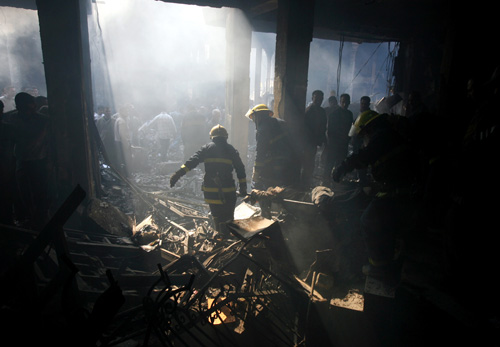Killings interrupt pilgrimage

Mar 7, 2007
Last updated on May 12, 2016 at 08:38 a.m.
BAGHDAD, Iraq – Two suicide bombers turned a procession of Shiite pilgrims into a blood-drenched stampede Tuesday, killing scores with a first blast and then claiming more lives among fleeing crowds. At least 106 were killed amid a wave of deadly strikes against Shiites heading for a solemn religious ritual.
Hours after the attack in Hillah – in the Shiite heartland south of Baghdad – boys used long-handled squeegees to push pools of blood off the road. The victims’ shoes and sandals were gathered in haphazard piles.
“In an instant, bodies were set ablaze, people were running and the ground was mixed with teapots, kettles and other supplies for pilgrims,” said Mahdi Kadim, one of the survivors.
But there was also a louder message in the carnage that left at least 130 pilgrims dead throughout Iraq: U.S.-backed authorities remain virtually powerless to stop suspected Sunni insurgents trying to push Iraq toward a sectarian civil war.
Get The Daily Illini in your inbox!
U.S. forces, too, continue to tally losses at the hands of extremists despite signs of more successful raids against bases and weapon stockpiles. The military said nine soldiers were killed Monday in two separate roadside bombings north of Baghdad, making it the deadliest day for U.S. troops in Iraq in nearly a month.
“A brutal massacre against people who are only practicing their faith” was how Shiite lawmaker Sami al-Askari described the Hillah attacks, which wounded at least 151 people.
Dr. Mohammed al-Temimi, at Hillah’s main hospital, said some of the injuries were critical and the death toll of 106 could rise.
The Hillah strike came after gunmen and bombers hit group after group of Shiite pilgrims elsewhere – some in buses and others making the traditional trek on foot to the shrine city of Karbala, about 50 miles south of Baghdad. At least 24 were killed in those attacks, including four relatives of a prominent Shiite lawmaker, Mohammed Mahdi al-Bayati.
This weekend, huge crowds of Shiite worshippers will gather for rites marking the end of a 40-day mourning period for the death of Imam Hussein, the grandson of the Prophet Muhammad. Hussein died near Karbala in a 7th-century battle.
In Hillah, southeast of Karbala, a long line of pilgrims marched toward a bridge checkpoint on the edge of the city. Food and cool drinks were distributed at nearby tents.
The first suicide bomber killed dozens and touched off a mad dash away from the bridge, said witness Salim Mohammed Ali Abbas. As the fleeing crowd grew thicker, another suicide bomber among them blew himself apart.
A police commander, Brig. Gen. Othman al-Ghanemi, said the attackers joined the procession outside Hillah and waited until it reached the checkpoint bottleneck to try to maximize the damage.
“The government bears some responsibility for this,” complained a Shiite parliament member, Bahaa al-Araji. “It has not provided enough security to protect the pilgrims.”
In the past two years, the powerful Mahdi Army militia watched over pilgrimages to Karbala. But the group agreed to put down its arms under intense pressure from the government, which wanted to avoid any confrontations with U.S.-led forces during a Baghdad security crackdown launched last month.
“This year, things are sadly different,” said al-Araji.
But the Mahdi Army has been unable to protect other religious pilgrimages. In February 2005, a suicide car bomber hit mostly Shiite police recruits in Hillah, killing 125 people.
U.S. forces, meanwhile, suffered their deadliest day since Feb. 7, when 11 troops were killed – seven when their helicopter was shot down north of Fallujah and four others in combat operations.
The military said six soldiers of the 82nd Airborne Division were killed Monday in a bombing in Salahuddin province. It was the single largest loss of life in the past three years of combat for the Fort Bragg, N.C.-based unit, said division spokesman Maj. Tom Earnhardt.
Three other soldiers died the same day in a roadside bomb attack in Diyala province northeast of Baghdad.
Both provinces are Sunni-dominated and have seen a rise in violence since additional U.S. forces moved into Baghdad as part of security sweeps.
The Pentagon has pledged 17,500 additional combat troops for the capital.
Associated Press Writer Ryan Lenz with U.S. troops in Baghdad contributed to this report.





